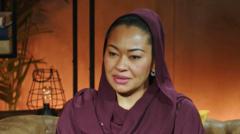Natasha Akpoti-Uduaghan, a suspended senator from Nigeria, has disclosed unsettling details about her experience within the Senate, which she has likened to a "cult." Her claims follow a six-month suspension imposed on her after she accused Senate President Godswill Akpabio of sexual harassment. The senator’s distressing testimony has shone a light on the broader issues of gender inequality and systemic biases faced by women in Nigerian politics.
In her poignant interview with the BBC, Akpoti-Uduaghan articulated fears for her safety after being stripped of her security detail. She characterized the Senate under Akpabio’s leadership as an autocracy where dissent is ruthlessly suppressed. “The Senate president runs the Senate like a dictator, not a democrat. There is no freedom of speech,” she asserted.
The nature of the alleged harassment dates back to a visit to Akpabio’s residence in January 2023, where Akpoti-Uduaghan claims he made inappropriate comments and advances. While Akpabio’s office refutes her claims, asserting there were no sexual advances made, Akpoti-Uduaghan maintains that this incident was part of a larger pattern of misconduct prevalent within the Senate.
Her accusations are especially poignant given Nigeria's alarming statistics regarding female representation in governance; out of 109 senators, only four are women. Akpoti-Uduaghan, being the first female senator from her home state, has often faced considerable challenges, including attempts to marginalize her politically and personally.
Following the dismissal of her harassment petition due to alleged “procedural errors,” Akpoti-Uduaghan was handed a suspension that opponents argue is retaliation for her allegations. Activists and civil society groups have rallied behind her, expressing how her predicament symbolizes the plight of many women in Nigeria.
“There is a deep-seated issue of misogyny present,” said women’s rights activist Hadiza Ado. Social media has emerged as a battleground for opinions, with Akpoti-Uduaghan facing both support and hostility from various factions.
Undeterred, Akpoti-Uduaghan is pursuing legal avenues to challenge her suspension and is determined to continue voicing her allegations of harassment. She feels a burgeoning sense of responsibility to advocate for women who feel voiceless. “I have gotten calls on a daily basis from women connecting with me... They say, Natasha, do this for us,” she revealed, underscoring her commitment to challenging the status quo in Nigerian politics.
In what has become a troubling chapter of her political career, Akpoti-Uduaghan's resolve is not merely for her own vindication, but also serves as a clarion call for an essential dialogue around gender equality and respect within political frameworks globally. As she navigates the public scrutiny and the challenges ahead, her story continues to resonate with many across Nigeria and beyond.



















